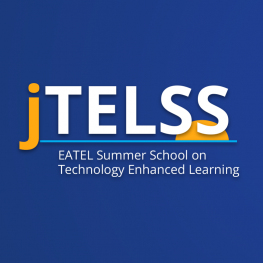Speakers
Paraskevi Topali
Radboud University, The NetherlandsIshari Amarasinghe
Radboud University, The NetherlandsUniversitat Pompeu Fabra, Spain
Alejandro Ortega-Arranz
Universidad de Valladolid, SpainMaria Jesús Rodriguez-Triana
Tallinn University, EstoniaLuis P. Prieto
Universidad de Valladolid, SpainStart
05/06/2023 - 16:00
End
05/06/2023 - 17:30
Building Better AI for Education: Designing for Human Values
Monday 05/06 16:00-17:30h
Workshop Space B
Abstract
Artificial Intelligence (AI) is evidence in several sectors of everyday life. Its use in the educational sector is promising in terms of facilitating to automate the teachers’ decision-making, content creation, assistance etc. Prior research highlighted the need of human-centred (HC) approaches within AI aiming to design and develop AI proposals that prioritise the humans’ needs. This involves AI solutions that meet the stakeholders’ goals and needs considering at the same time the educational context and the learning theories.The current workshop offers a venue to delve into the core ideas about HCAI in an interactive way. Participants will be informed on the pedagogical and theoretical background and will be involved in several hands-on activities reflecting on the AI and HCAI implications. They will try out several AI solutions. We envision that this workshop will be beneficial for all the PhD students -independently of their research focus – given the hype of AI and the need of guaranteeing inclusive, accessible AI solutions, respectful to the human needs.
Needs Analysis
Human-centred Artificial Intelligence (HCAI) is an approach to develop AI systems that prioritise the needs and experiences of humans. This involves designing AI algorithms and systems with the goal of enhancing human capabilities, rather than replacing or displacing them. The workshop will provide an opportunity for PhD candidates in TEL to develop a general understanding of HCAI technologies within the educational context. To this end, it seems relevant to understand not only the basics behind AI technologies (e.g., supervised and unsupervised techniques, large language models such as GPT-3), but also the pedagogical implications of their use in education. Additionally, participants will engage in hands-on activities dealing with approaches to be considered when designing HCAI in education. Furthermore, they will reflect on how to incorporate humans within the loop of responsible learning analytics, thus prioritising ethical, transparent, and accountable aspects.
Learning Objectives
- To understand the benefits and drawbacks of using AI and HCAI in academic/research contexts
- To get-to-know design methods and instruments that can be employed for the development of HCAI approaches (e.g., user personas, journey maps)
- To reflect upon the AI ethical considerations (e.g., privacy, bias, and transparency)
- To communicate and collaborate effectively among interdisciplinary teams
Pre-activities
Participants are invited to share beforehand AI tools that are being used or developed in their PhD. Therefore, these tools can be included in the WS hands-on activities. Additionally, participants are invited to prepare a short presentation (3min) about their AI tools to be presented at the beginning of the session, thus sharing their work with other AI-interested participants.
Session Description
- Topic’s introduction to Artificial Intelligence in Education [10 minutes]
- Examples of (educational) AI tools [5 minutes]
- Hands On-Activity #1
— Participants will be divided into several groups (depending on the number of participants) and will work with different AI-based tools that can be used in TEL [15 minutes]
— AI Ethics & limitations [10 min] - Introduction on HC Learning Analytics & on Value Sensitive Design (VSD) [10 minutes]
- Hands On-Activity #2:
— Introduction to the study [5 minutes]
— Participants’ will be divided into several groups and will be involved in a real VSD case [15 minutes]
— Group presentations of the created artefacts [5 minutes] - Wrap Up: Final conclusions & Reflections [10 minutes]





